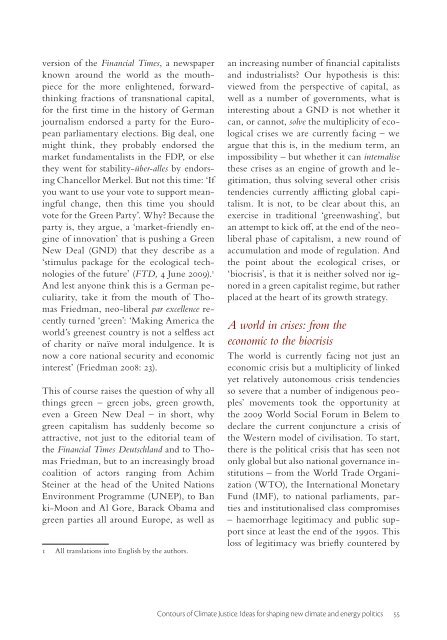Contours of Climate Justice - Dag Hammarskjöld Foundation
Contours of Climate Justice - Dag Hammarskjöld Foundation
Contours of Climate Justice - Dag Hammarskjöld Foundation
You also want an ePaper? Increase the reach of your titles
YUMPU automatically turns print PDFs into web optimized ePapers that Google loves.
version <strong>of</strong> the Financial Times, a newspaper<br />
known around the world as the mouthpiece<br />
for the more enlightened, forwardthinking<br />
fractions <strong>of</strong> transnational capital,<br />
for the fi rst time in the history <strong>of</strong> German<br />
journalism endorsed a party for the European<br />
parliamentary elections. Big deal, one<br />
might think, they probably endorsed the<br />
market fundamentalists in the FDP, or else<br />
they went for stability-über-alles by endorsing<br />
Chancellor Merkel. But not this time: ‘If<br />
you want to use your vote to support meaningful<br />
change, then this time you should<br />
vote for the Green Party’. Why? Because the<br />
party is, they argue, a ‘market-friendly engine<br />
<strong>of</strong> innovation’ that is pushing a Green<br />
New Deal (GND) that they describe as a<br />
‘stimulus package for the ecological technologies<br />
<strong>of</strong> the future’ (FTD, 4 June 2009). 1<br />
And lest anyone think this is a German peculiarity,<br />
take it from the mouth <strong>of</strong> Thomas<br />
Friedman, neo-liberal par excellence recently<br />
turned ‘green’: ‘Making America the<br />
world’s greenest country is not a selfl ess act<br />
<strong>of</strong> charity or naïve moral indulgence. It is<br />
now a core national security and economic<br />
interest’ (Friedman 2008: 23).<br />
This <strong>of</strong> course raises the question <strong>of</strong> why all<br />
things green – green jobs, green growth,<br />
even a Green New Deal – in short, why<br />
green capitalism has suddenly become so<br />
attractive, not just to the editorial team <strong>of</strong><br />
the Financial Times Deutschland and to Thomas<br />
Friedman, but to an increasingly broad<br />
coalition <strong>of</strong> actors ranging from Achim<br />
Steiner at the head <strong>of</strong> the United Nations<br />
Environment Programme (UNEP), to Ban<br />
ki-Moon and Al Gore, Barack Obama and<br />
green parties all around Europe, as well as<br />
1 All translations into English by the authors.<br />
an increasing number <strong>of</strong> fi nancial capitalists<br />
and industrialists? Our hypothesis is this:<br />
viewed from the perspective <strong>of</strong> capital, as<br />
well as a number <strong>of</strong> governments, what is<br />
interesting about a GND is not whether it<br />
can, or cannot, solve the multiplicity <strong>of</strong> ecological<br />
crises we are currently facing – we<br />
argue that this is, in the medium term, an<br />
impossibility – but whether it can internalise<br />
these crises as an engine <strong>of</strong> growth and legitimation,<br />
thus solving several other crisis<br />
tendencies currently affl icting global capitalism.<br />
It is not, to be clear about this, an<br />
exercise in traditional ‘greenwashing’, but<br />
an attempt to kick <strong>of</strong>f , at the end <strong>of</strong> the neoliberal<br />
phase <strong>of</strong> capitalism, a new round <strong>of</strong><br />
accumulation and mode <strong>of</strong> regulation. And<br />
the point about the ecological crises, or<br />
‘biocrisis’, is that it is neither solved nor ignored<br />
in a green capitalist regime, but rather<br />
placed at the heart <strong>of</strong> its growth strategy.<br />
A world in crises: from the<br />
economic to the biocrisis<br />
The world is currently facing not just an<br />
economic crisis but a multiplicity <strong>of</strong> linked<br />
yet relatively autonomous crisis tendencies<br />
so severe that a number <strong>of</strong> indigenous peoples’<br />
movements took the opportunity at<br />
the 2009 World Social Forum in Belem to<br />
declare the current conjuncture a crisis <strong>of</strong><br />
the Western model <strong>of</strong> civilisation. To start,<br />
there is the political crisis that has seen not<br />
only global but also national governance institutions<br />
– from the World Trade Organization<br />
(WTO), the International Monetary<br />
Fund (IMF), to national parliaments, parties<br />
and institutionalised class compromises<br />
– haemorrhage legitimacy and public support<br />
since at least the end <strong>of</strong> the 1990s. This<br />
loss <strong>of</strong> legitimacy was briefl y countered by<br />
<strong>Contours</strong> <strong>of</strong> <strong>Climate</strong> <strong>Justice</strong>. Ideas for shaping new climate and energy politics 55
















